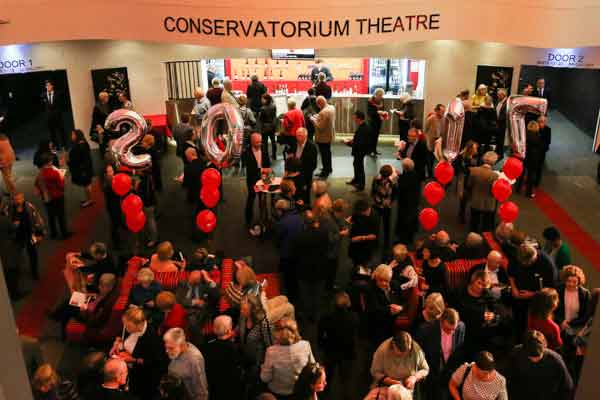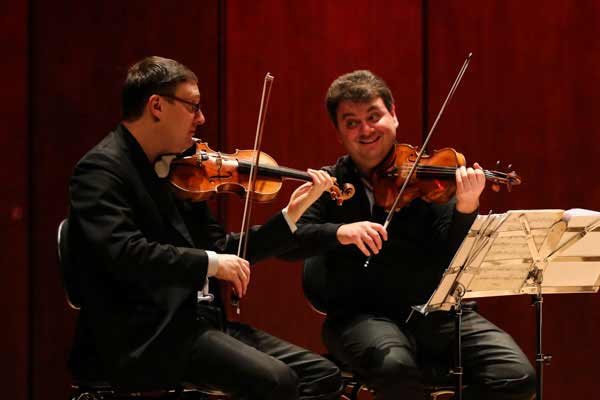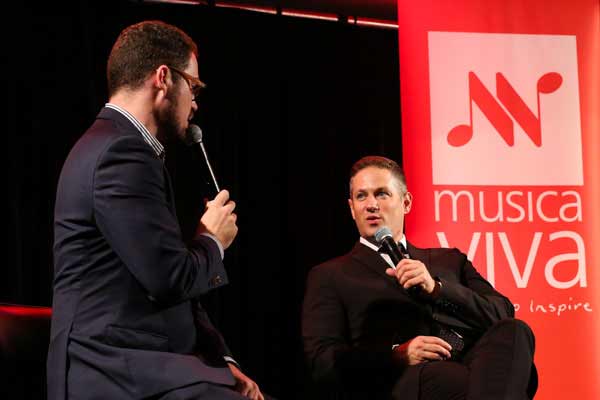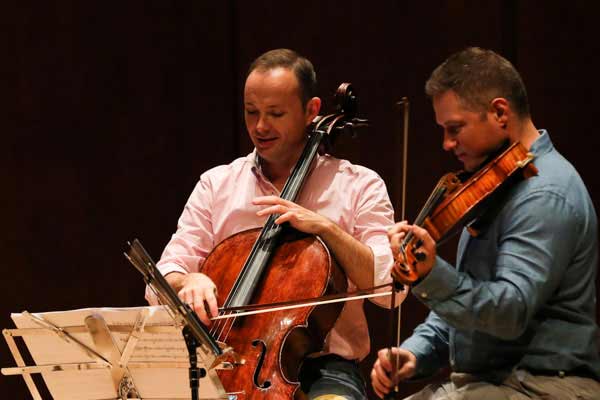The highly regarded Jerusalem Quartet has enjoyed a long association with Musica Viva, visiting Australia numerous times in the 2000s.
After a seven year hiatus, during which time Ori Kam has replaced Amihai Grosz as viola player, they have returned with a full series of concerts for Musica Viva, in this the quartet’s 20th anniversary year. This year’s series comprises two different programmes, both built around Ross Edwards’ String Quartet no. 3; the performance in Brisbane was ‘Program 2’ with Edwards’ work flanked by Haydn and Beethoven.
Click here for more photos.
String Quartet no. 3 'Summer Dances' was commissioned for Musica Viva Australia, and although it was premiered in 2014, this is its first presentation in a national tour setting. Strongly influenced by sounds from nature, in particular the Australian bush, the work is unpredictable and intense.
 Image © Karen Hutt
Image © Karen HuttAlthough occasional moments tend towards the establishment of a melody, these are snatched back before the theme can be fully developed, in much the same way that fragments of birdsong might reference half-forgotten refrains, only to stop or veer off in another direction.
Moments of discordance brought vividly to mind the shrieking of cockatoos, and there is a vitality and intensity in this music that echoes the raw reality of life in the bush. The background hum of a million insects contrasts with an ecstatic musical celebration of the improbably vibrant colours of parrots. A later segment, by turns both gentle and passionate, recalled brolgas dancing on a floodplain, and Sidney Long’s famous painting.
 Image © Karen Hutt
Image © Karen HuttHaydn was hugely influential in the development of the string quartet as a musical form. ‘The Lark’ is a good example of the evolution of this conversational and almost democratic style of composition, with each instrument taking turns at leading and developing the melody. Although the Jerusalem Quartet are famed for their flawless technique, in this performance it felt a little as if they were merely walking their way through the piece – walking flawlessly, but without great emotion. It took the Edwards, and then, after the intermission, Beethoven, to really wake them up – in the post-concert Q&A session, they did confess to being somewhat jet-lagged!
However, by the time we reached the Beethoven, the quartet was in fine form, and the superlatives often cited by the critics were fully justified. The first of a trio of quartets, commissioned by the Russian ambassador to Vienna, this work shows Beethoven moving definitively away from the Classicism of earlier works – we have not quite reached the full heights of unbridled Romanticism, but the seeds have most decidedly been sown. The performance here was brimming with energy and emotion, with evident engagement on the part of the players. There was a passion and flamboyance that swept us up and away; a final flourish which, much like the concluding bow sweeps of cellist Kyril Zlotnikov, conveyed and reflected satisfaction in a job ultimately well done.
 Image © Karen Hutt
Image © Karen HuttClick here for more photos.
Playlist:
Joseph Haydn – String Quartet op 64 no. 5 ‘The Lark’ (1790-92)
Ross Edwards – String Quartet no. 3 'Summer Dances' (2012)
Ludwig van Beethoven – String Quartet no. 7 in F major, op 59 no. 1 ‘Razumovsky’ (1806)
The Jerusalem Quartet are:
Alexander Pavlovsky (violin)
Sergei Bresler (violin)
Ori Kam (viola)
Kyril Zlotnikov (cello)

